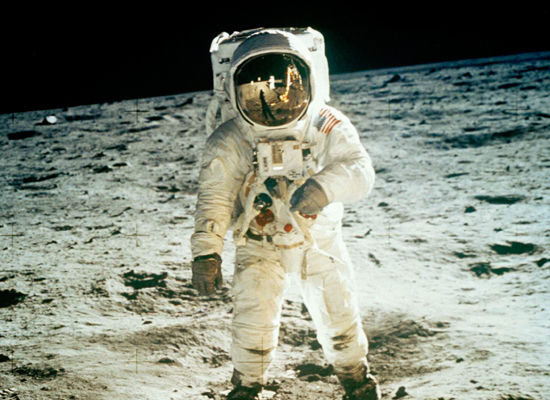 |
| Surreal postmodernist art: That's Aldrin; but if you look at the reflection in the visor, you will see Armstrong. |
 |
| Some folks make bigger footprints than others |
"If we can send a man to the Moon, why can't we send a man to the Moon?" -- Dr. Jerry Pournelle
 |
| Left to right: Armstrong, Collins, Aldrin Collins is the Forgotten Astronaut |



I was back from the post-coup Torrijos Panama and had hit my head performing a back dive at my family's church campgrounds in New Hope, PA, the week before the launch and as the cool water filled my lungs, my last thought that I still recall was, "I can't miss the Moon landing."
ReplyDeleteI didn't then, but I've now lived over three decades missing them.
That's a sad commentary on the state of civilization.
JJB
What with all the private sector space stuff, I think we'll be back there before too long.
ReplyDeleteI remember going outside to look at the moon during the first landing from our SoCal backyard, being about as amazed as a 14 yr old boy could possibly be.
ReplyDeleteThat's a sad commentary on the state of civilization.
Why?
As amazing as the feat was, to continue doing it would be pointless. Getting mass into space is, by at least three orders of magnitude, to expensive to be worth the candle.
And, in my very humble and unqualified opinion, will always be.
Which is a inconvenient comment about reality, but not a sad commentary on civilization.
Lifting mass to LEO is expensive because the government is doing it, and the purpose of a government bureau is to employ government bureaucrats. I understand operating costs become much less when business models are applied. Certainly private suborbital flights are less expensive than lofting Alan Shepard was.
DeleteI understand operating costs become much less when business models are applied.
ReplyDeleteAbsolutely.
However, I think it is very likely that lifting mass into space will follow the same sort of cost-performance curve that all (SFAIK) other similar technologies have. For example, airplanes initially had a very substantial increase in the performance to cost ratio, with both performance increasing and cost decreasing. However, since introducing the turbine engine, performance has remained essentially unchanged (a B787 scarcely goes any faster than a B707). Cost has decreased substantially over that time, but -- yes, I know never is a long time -- there doesn't look like being any possibility that getting from A - B via airplane will ever get any faster than it is now.
Cars, ships, and trains are essentially the same.
SpaceX has shown that private enterprise can put stuff in orbit and get it back a lot cheaper than the gov't can. (I happen to know someone who works there, and got a plant tour a couple months ago -- fascinating.) However, IMHO, we have reached a performance plateau, and cost has an intrinsic floor that will always be far too high to render manned trips to the moon, never mind anywhere else, pointless.
The answer to Fermi's paradox is simple: You can't get there from here. And even if you could, there would be no stopping.